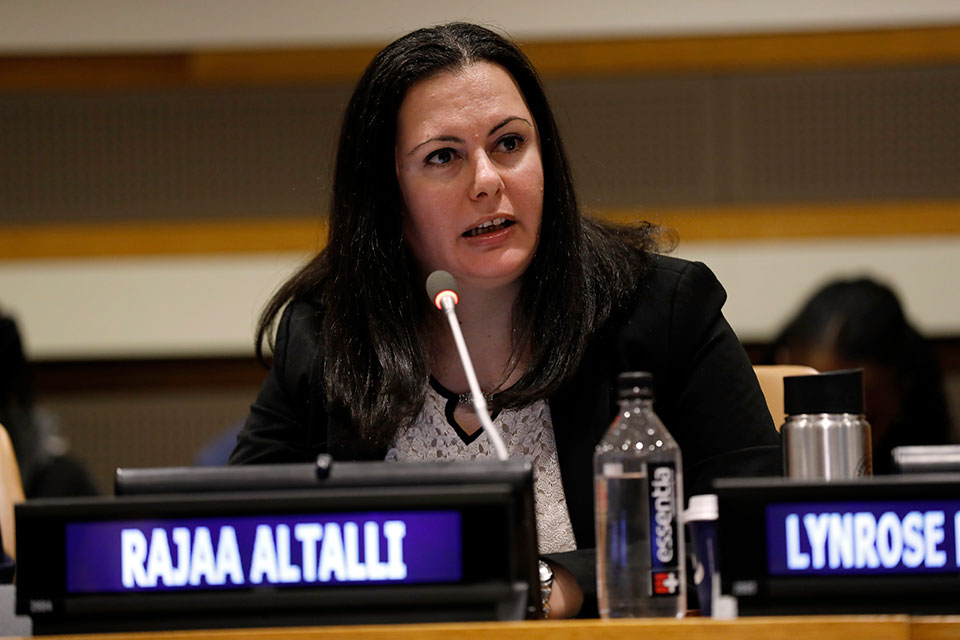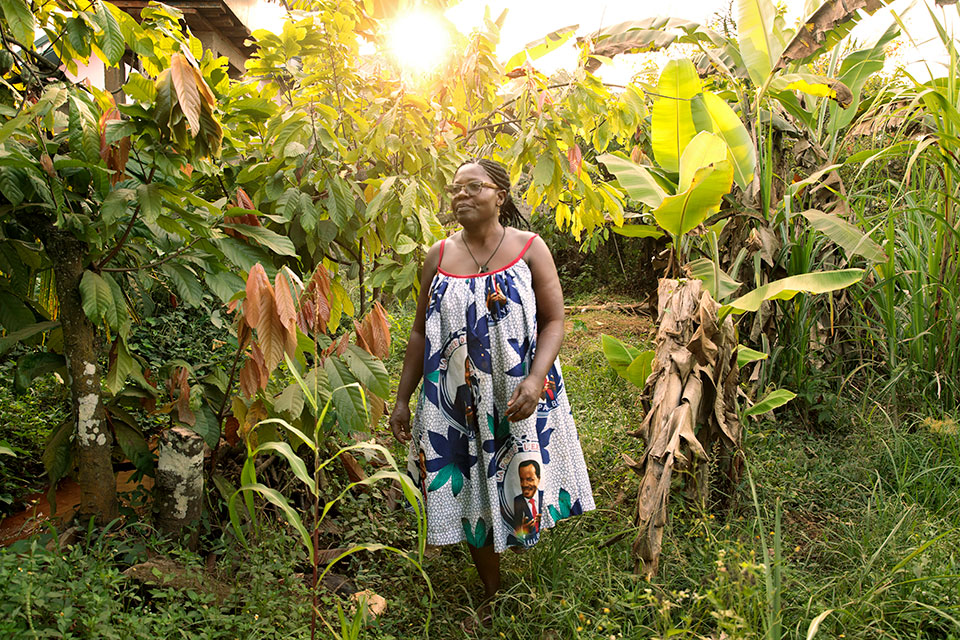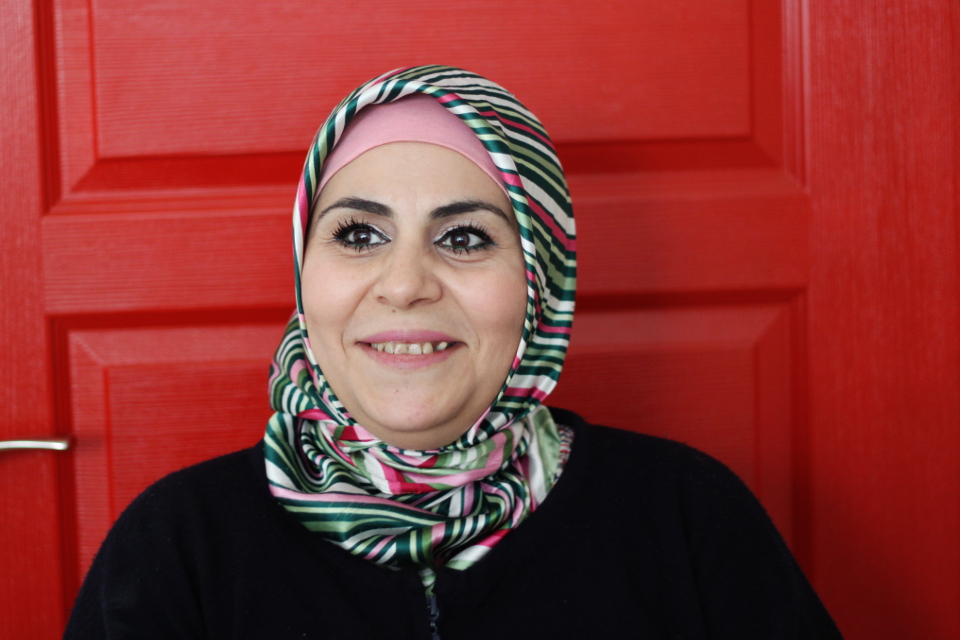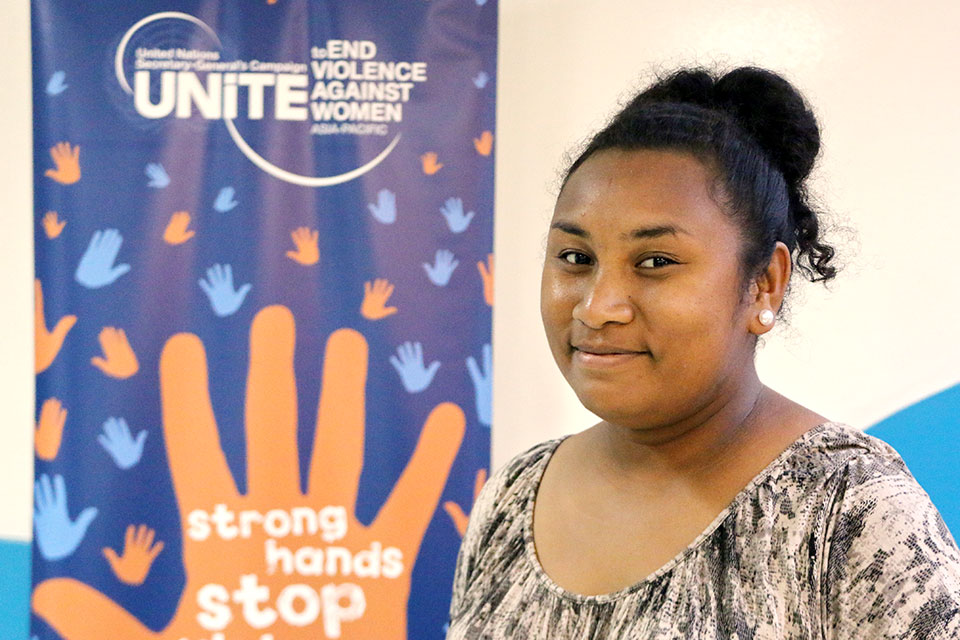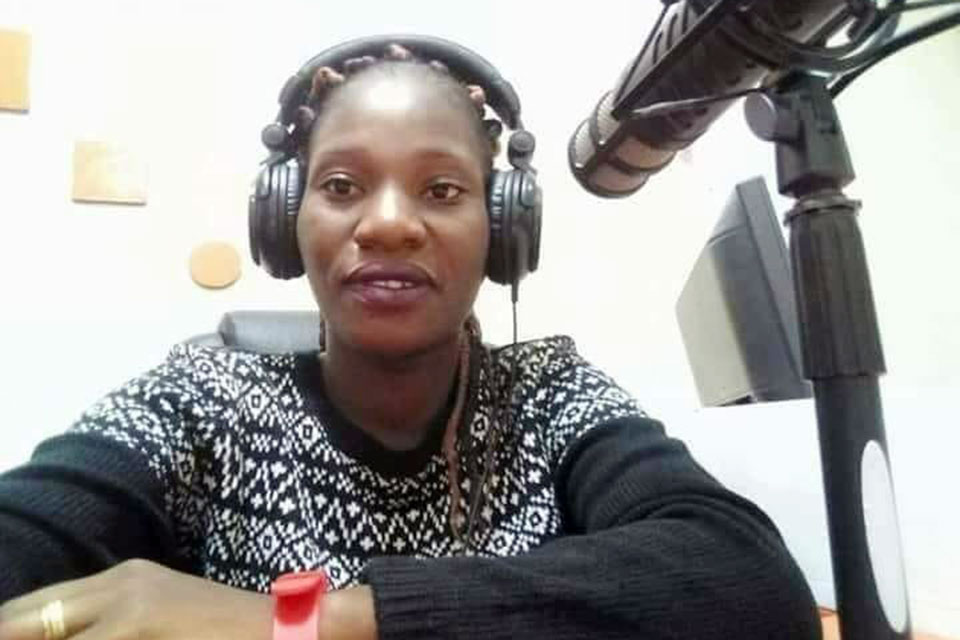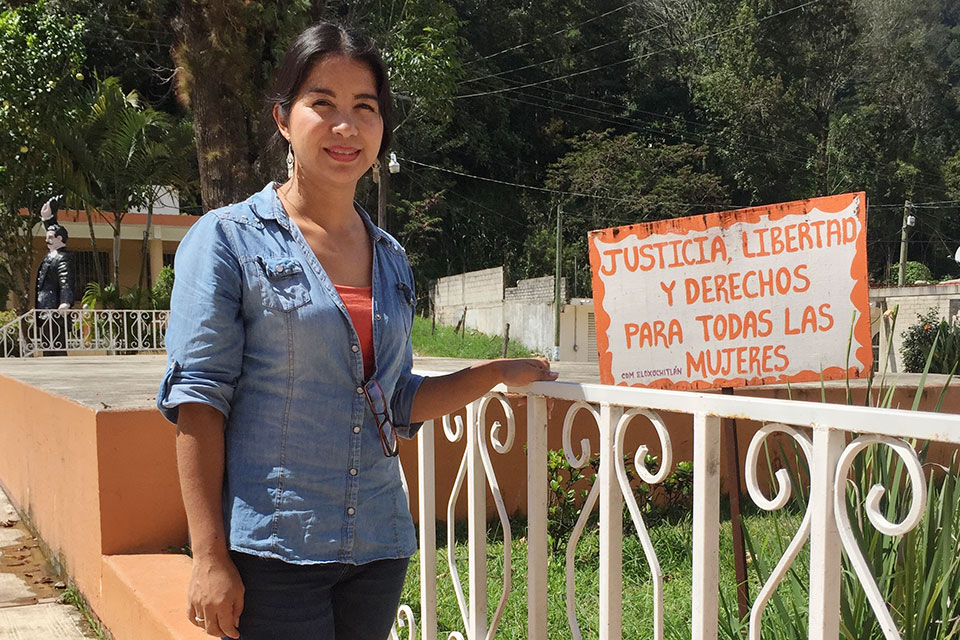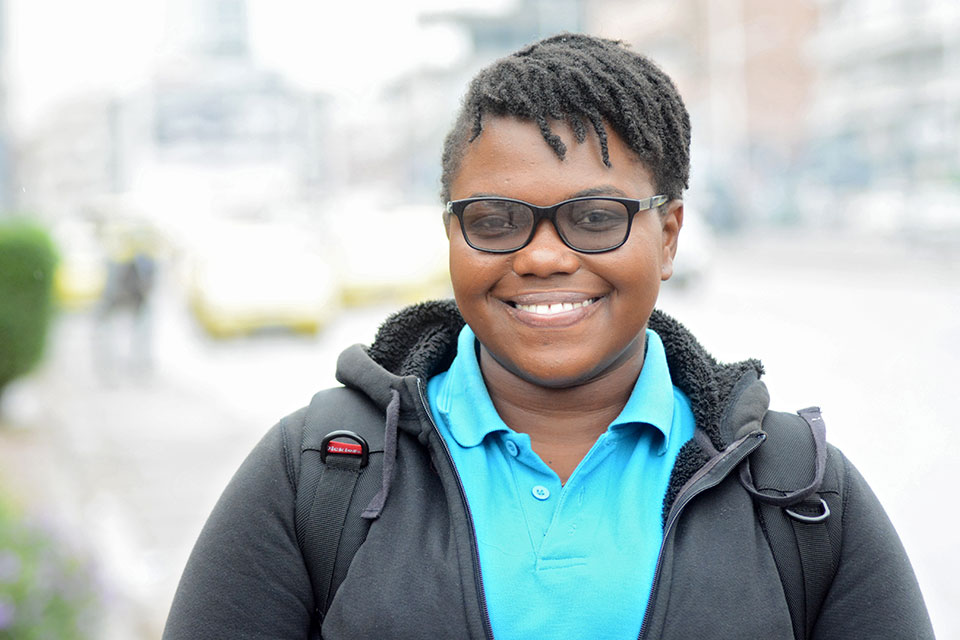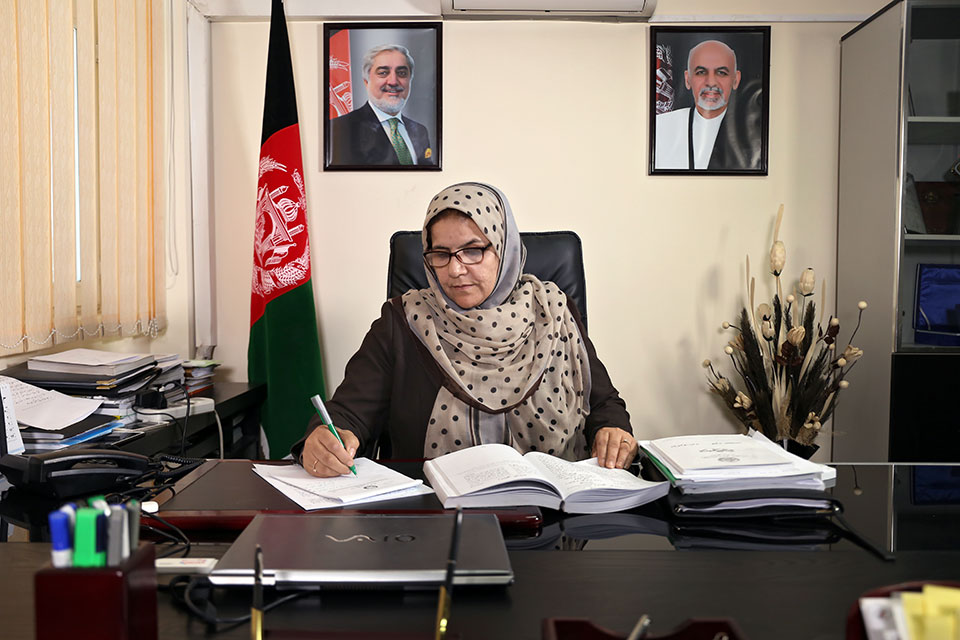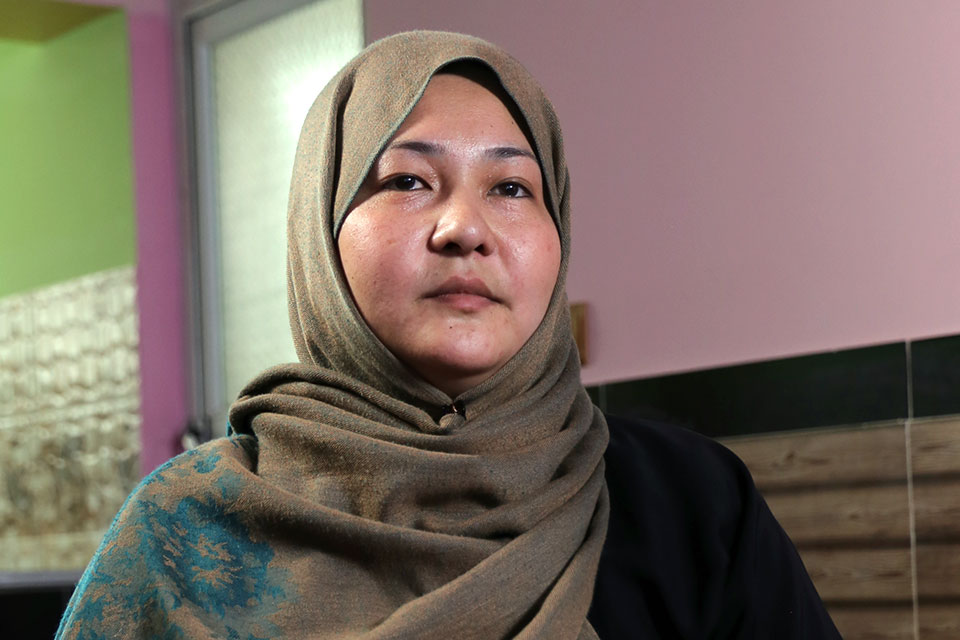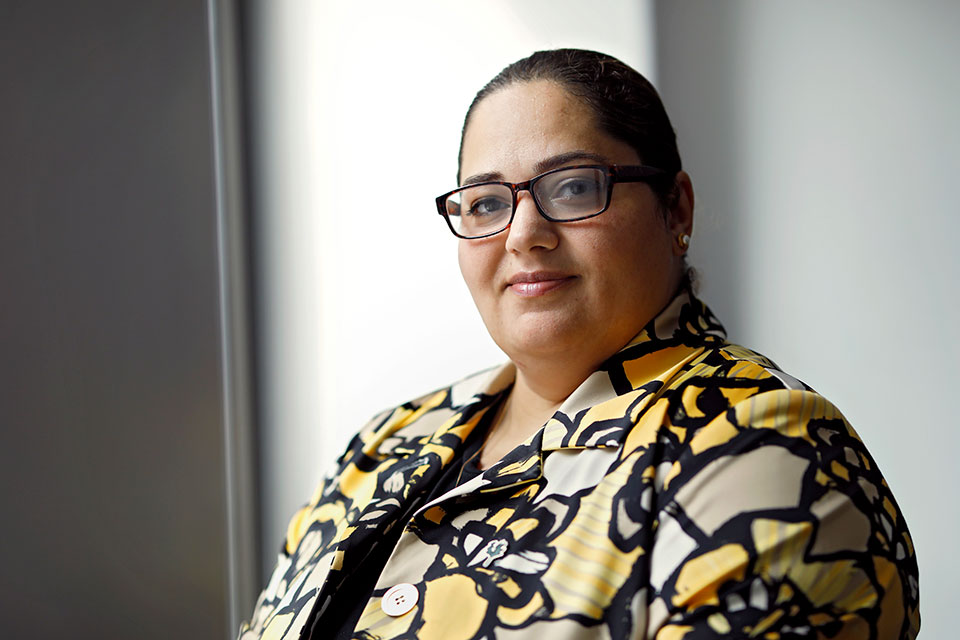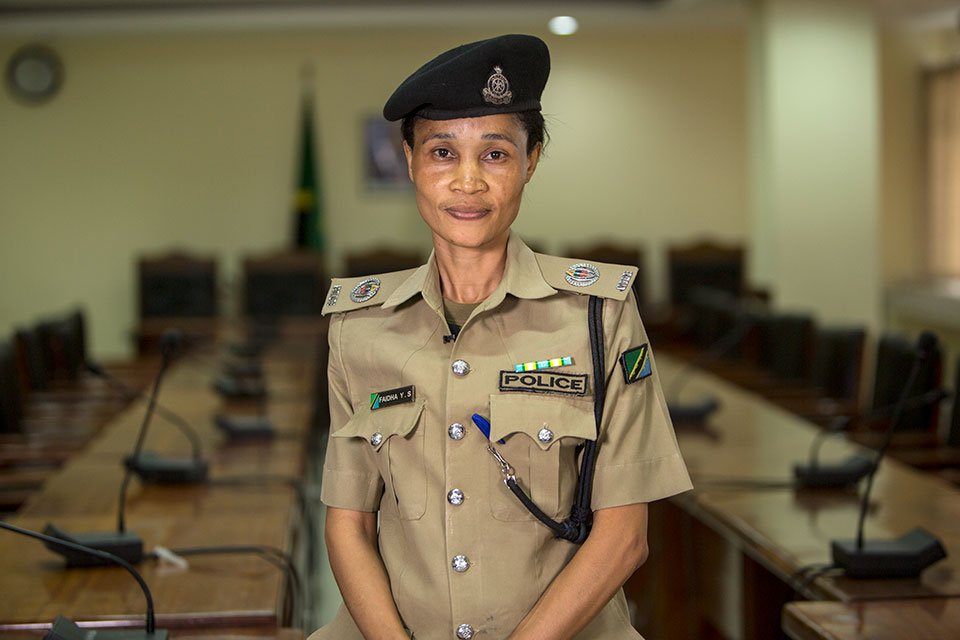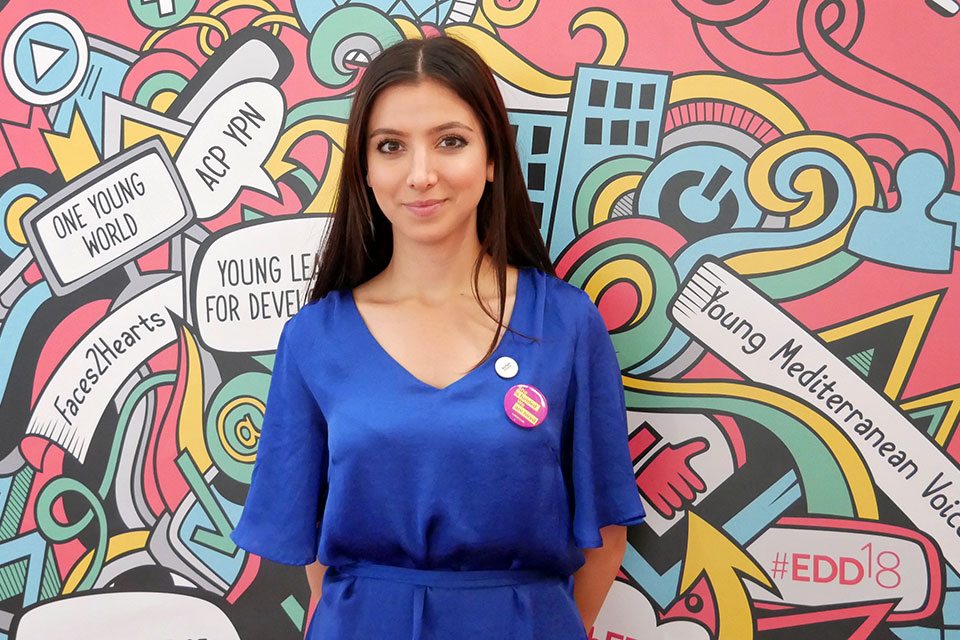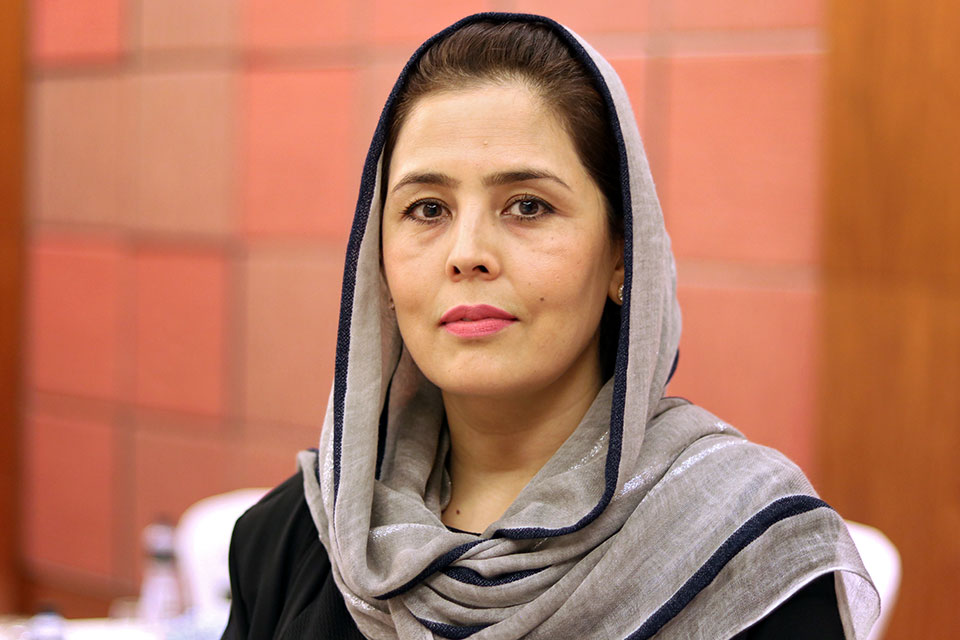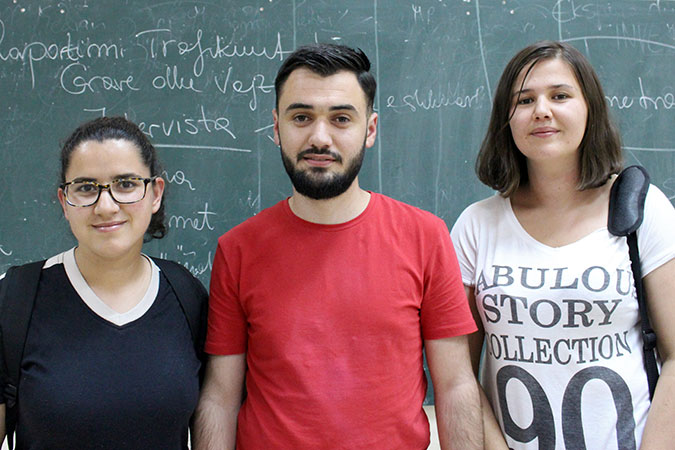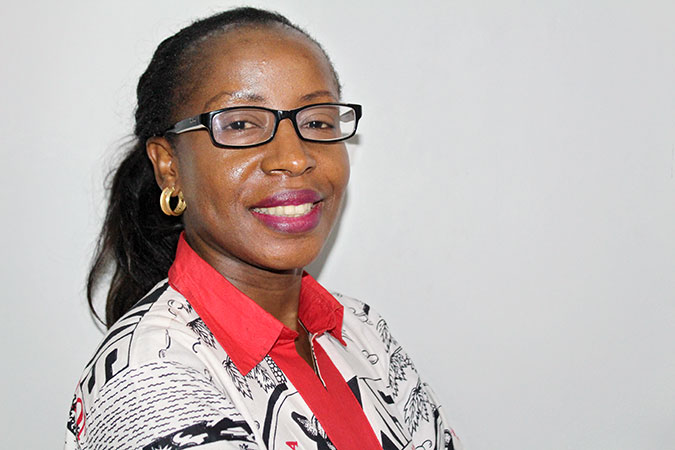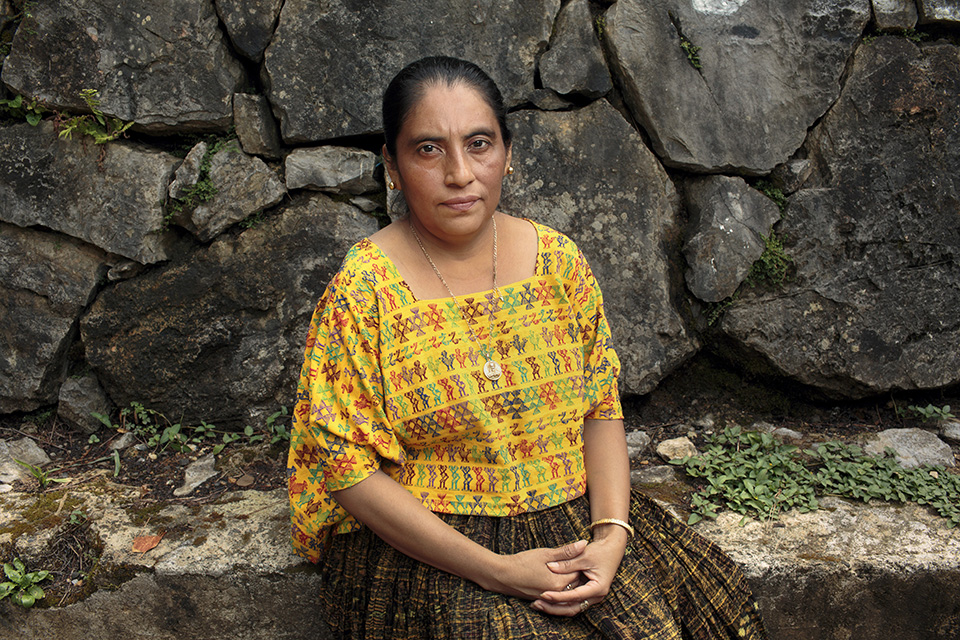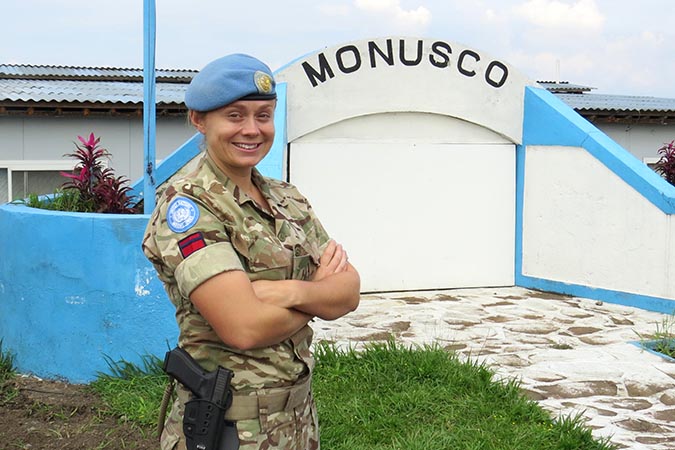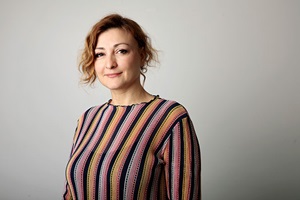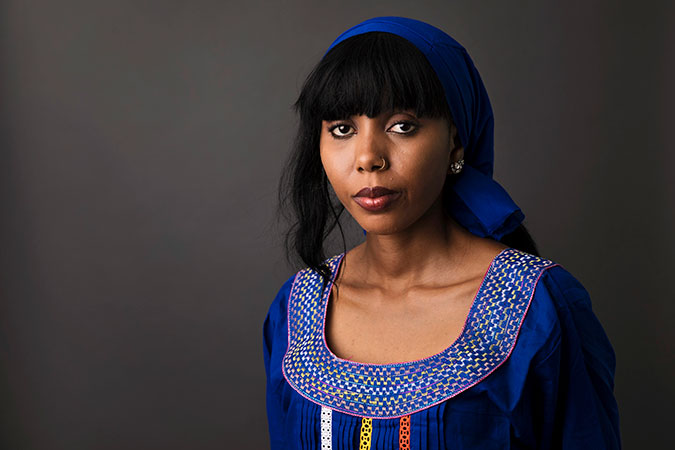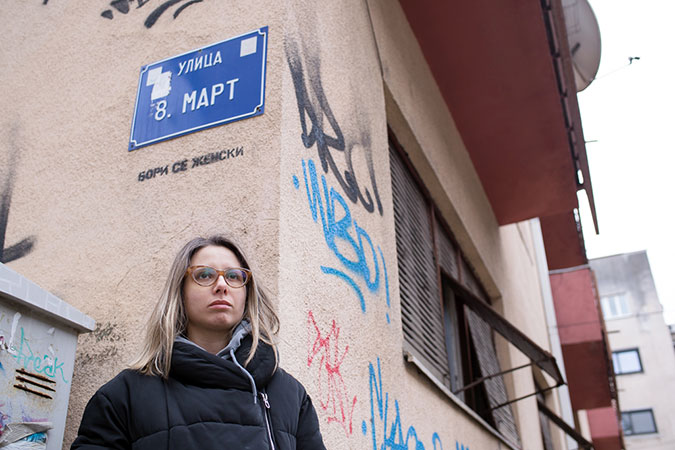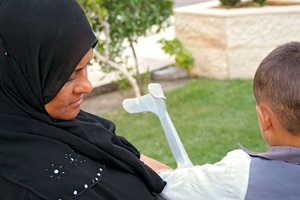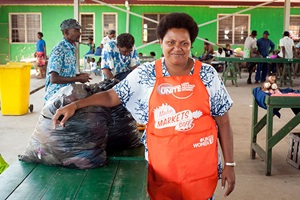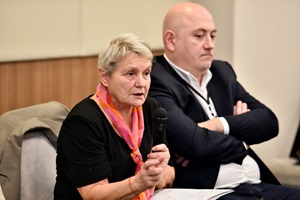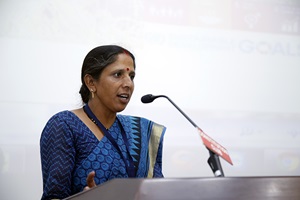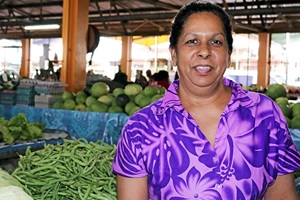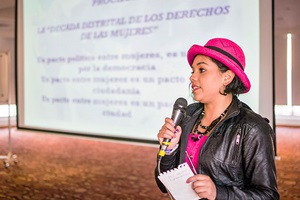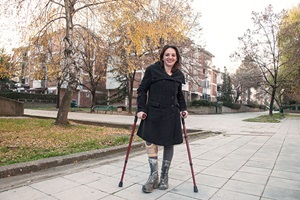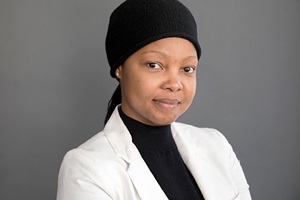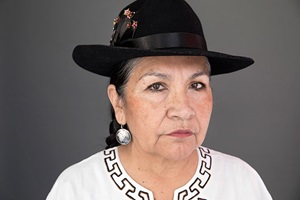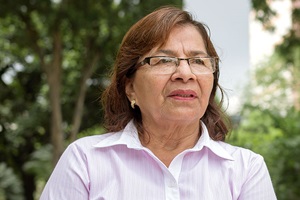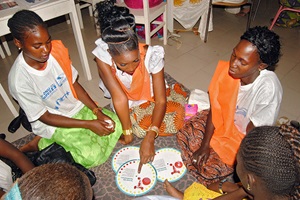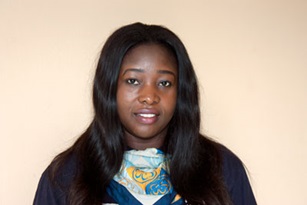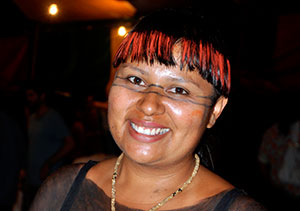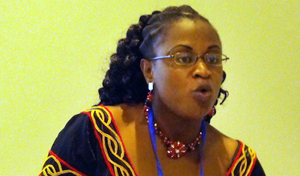In the words of...
These first-person accounts by UN Women partners or beneficiaries detail specific problems, what’s being done to address them, and how change is underway.
In the words of Rajaa Altalli: “Women are leading efforts to push forward in Syria”
Rajaa Altalli was 12 years old when her father was arrested by the Syrian government for being part of a political party. She thought she would never be involved in public life, but as the Syrian revolution erupted, she decided otherwise. Altalli is now a member of the Syrian Women’s Advisory Board (WAB), established by the UN Special Envoy for Syria to ensure that women’s perspectives and leadership is taken into account in the peace process. Read more »
In the words of Mereng Bessela: “I am a fighter and I do everything I need to”
Mereng Alima Bessela, age 50, is a successful entrepreneur from Ntui, in the Central Region of Cameroon. She is a cocoa farmer, which is traditionally farmed by men, has her own restaurant business and a fish farm. Like thousands of women in the region, Madame Bessala has no lack of acumen, but needs access to skills, markets and finance. Read more »
In the words of Nur Omar: “I’ve healed the wounds of war and feel more confident about my future”
The SADA Women Empowerment and Solidarity Centre provides livelihood skills and psycho-social support and referral services to refugees like Nur Omar and local women in Gaziantep, Turkey. Set-up by UN Women, the Centre helps women like Nur Omar learn new skills and start a brighter future. Read more »
In the words of Captain Anaseini Navua Vuniwaqa: “There is a need for female peacekeepers”
Captain Anaseini Navua Vuniwaqa of the Republic of Fiji Military Forces, participated in the ninth edition of the Female Military Officers’ Course in April 2018. The course aims to bridge the gender gap in UN peacekeeping. Women currently represent only 4 per cent of the more than 80,000 UN Peacekeepers, despite their key role in preventing sexual violence during and after conflict, and their unique abilities to engage with the communities they serve, especially women and girls. Captain Vuniwaqa spoke to UN Women about women’s role in preventing sexual violence during and after conflict, and their unique abilities to engage with the communities they serve. Read more »
In the words of Joanna Oala: “It’s better to speak up and let your voice be heard”
Meet Joanna Oala, 25, from Port Moresby, who has become a champion to end violence against women and girls. She is one of the volunteers of a UN Women-led campaign, SANAP WANTAIM, which has brought together men, women and youth from all walks of life to make Port Moresby safer for women and girls. Read more »
In the words of Bettie Johnson Mbayo: “Men need to be involved in reporting on this issue because they dominate the newsrooms”
Award-winning journalist Bettie Johnson Mbayo from Frontpage Africa took a 16-hour motorbike ride last year through Southeastern Liberia to find a 13-year-old girl who was raped by a law-maker. Despite receiving threats, Mbayo pursued the story relentlessly, following leads on social media and interviewing family members, neighbours, school officials and the police. Her reporting resulted in the arrest of the alleged perpetrator. Read more »
In the words of Aiman Umarova: “If violence is condemned to silence, that does not mean that it’s not in our lives”
Aiman Umarova is an acclaimed Kazakhstani lawyer and human rights activist who specializes in sexual offences against women and children, and crimes related to violent extremism and torture. She has dedicated her life to fight violence against women, despite facing threats of violence herself. Read more »
In the words of Aissa Doumara Ngatansou: “My own experience of discrimination inspired me to become the activist that I am today”
Aissa Doumara Ngatansou is a 46-year-old mother of three children from the Far North Region of Cameroon. She co-founded a branch of the Association for the Elimination of Violence Against Women (ALVF) in the city of Maroua in 1996. ALVF works with survivors, and advocates with decision-makers to end early and forced marriages, and other forms of gender-based violence. Read more »
In the words of Elisa Zepeda Lagunas: “It is essential for me to occupy these spaces and to open them up for others”
Elisa Zepeda Lagunas, 34, is an aquaculture engineer, Mazatec indigenous leader and women’s rights defender who has suffered intense violence due to her political activism. Read more »
In the words of Emmanuella Zandi Mudherwa: “I want every survivor to be called victorious”
Emmanuella Zandi Mudherwa, 21, founded her own non-profit organization, “Ma Voisine” (My neighbour) in Kinshasa, Democratic Republic of Congo, which promotes girls’ empowerment by girls. Today it has 12,000 members around the country. She collaborates with UN Women on initiatives to raise awareness about gender-based violence. Read more »
In the words of Hajer Sharief: “Peacebuilding is not only about stopping violence, it is also about the prevention of violence”
Hajer Sharief is the co-founder of the organization “Together We Build it”, which aims to promote a peaceful democratic transition in Libya, inclusive of women and youth. Read more »
In the words of Justice Anisa Rasooli: “Not all women in Afghanistan are women in blue burqas begging…we can be the best engineers, doctors, judges, teachers”
Justice Anisa Rasooli was recently appointed as the first woman to sit on the Supreme Court of Afghanistan. She has been a powerful advocate for bringing more women into judicial positions, including as a leader of the Afghan Women Judges Association. Read more »
In the words of Halima Askari: “Our victory is our unity”
Halima Askari became the first woman head of the Provincial Council in Afghanistan’s conservative Wardak province in 2017. She is part of a new generation of women leaders who, little by little, are pushing for the transformation of governance. She ran for national Parliament this year and is awaiting the results. Regardless of the election results, Askari is determined to continue serving her community and advocating for girls’ and women’s education. Read more »
In the words of Tanya Gilly Khailany: “When it comes to women’s rights, there’s no room for diplomacy”
Tanya Gilly Khailany, from Iraqi-Kurdistan, is a former member of the Iraqi Parliament (2006 – 2010) and a co-founder of the SEED Foundation, an organization that works with survivors of violence and trafficking in Iraq. An outspoken women’s rights activist, Ms. Gilly Khailany was one of the key parliamentarians who legislated the 25 per cent quota for women in Iraqi provincial councils. Read more »
In the words of Faidah Suleiman: “Through my job I’m making changes in my family and in the society”
Faidah Suleiman is the Superintendent of Police, Gender and Children Desk in Tanzania. With 20 years of police experience, she has been part of the Gender Desk since it was established in 2009. In 2014, UN Women partnered with the Gender and Children Desks to improve the quality of services provided. Read more »
In the words of Taffan Ako: “I believe you have to be in the system in order to change the system”
A refugee from Iraqi Kurdistan, Taffan Ako fled to Sweden in 1997 with her family. Today she is the Coordinator of One Young World Ambassadors for Scandinavia and Eastern Europe and founder of EmpowHERment, an organization that assists women and young girls who have been former ISIS sex slaves or victims of human trafficking. Her foundation finances integration projects for children and women in Europe and in Iraqi Kurdistan. Ako was one of the Young Leaders attending the EU Development Days in June 2018 and spoke to UN Women about her experience growing up as a refugee in Sweden and her activism today. Read more »
In the words of Marta Vieira da Silva: “Believe in yourself and trust yourself”
Brazilian soccer player Marta Vieira da Silva is UN Women Goodwill Ambassador for women and girls in sport. Marta, as she is popularly known, wants to inspire people to challenge stereotypes, overcome barriers and follow their dreams and ambitions, including in the area of sport. An icon and role model for many, Marta is widely regarded as the best female soccer player of all time and a top scorer of the FIFA Women’s World Cup tournament. During her recent visit to UN Women headquarters in New York, Marta spoke about her personal journey, motivation and what she hopes to do as UN Women Goodwill Ambassador. Read more »
In the words of Nabila Musleh: “Women and men must benefit equally from government funding, instead of one benefitting at the cost of the other”
Nabila Musleh, Afghanistan’s Deputy Minister of Women Affairs, has worked to promote gender equality, women’s empowerment and human rights in Afghanistan for more than 10 years. From 11-16 August, Ms. Musleh joined 32 other senior government officials for a visit to Indonesia to learn about their gender-responsive budgeting experience. Read more »
In the words of Spartak Kosta: “The media should raise awareness about the issue of trafficking of women and girls”
Spartak Kosta is a third-year journalism student at the University of History and Philology in Tirana, Albania. He was among the first group of students to take a new university course on the reporting of trafficking of women and girls. The educational course was developed at the recommendation of a UN Women monitoring report. The study finds that journalists often write shallow trafficking stories that lack deep analysis and use unethical language with regards to victims. Read more »
In the words of Anny T. Modi: “Young women want to be considered as actors and agents of change”
Anny Tengandide Modi is a 36-year-old single mother living in Kinshasa, in the Democratic Republic of Congo (DRC). In July 2017, she joined the African Women Leaders Network, launched by UN Women, the African Union Commission and the Permanent Mission of Germany. Modi serves as the Youth Advocate within the Network. She is also the Executive Director of Afia Mama (Women’s Health), an organization committed to the reproductive health and access to justice for women, as well leadership development, economic empowerment, legal assistance and social development for young women. Read more »
In the words of Irlanda Pop: “People voted for me because they wanted to see change”
Irlanda Pop is the Mayor of Lanquín, a municipality in the Alta Verapaz department of Guatemala. She is the only indigenous Mayor and one of ten women Mayors in the country. Elected in 2015 for a term of four years, Pop has survived serious political attacks and continues to fight discrimination on account of her gender and indigenous identity. Read more »
In the words of Nidhi Goyal: “These spaces belong to everyone”
Nidhi Goyal, 32, is a disabled feminist from India who works on disability rights and gender equality. After losing her sight as a teenager, Goyal committed herself to changing the lives of persons with disabilities, and particularly women and girls with disabilities. As a researcher, writer, trainer, stand-up comedian and advocate, she works to raise awareness on the intersection of the disability rights movement, and the women’s movement. Read more »
In the words of Ruth Kihiu: “Empowering Maasai women in northern Tanzania”
uth Kihiu is a Programme Manager at The Pastoral Women’s Council (PWC), which works to socio-economically empower marginalized pastoralist Maasai women in Ngorongoro, Monduli, and Longido districts in Tanzania, through livelihood and income-generating activities. PWC, supported by UN Women’s Fund for Gender Equality, also aims to educate women and girls about their rights and equip them with leadership skills. Read more »
In the words of Major Cleo Bigwood: “Many of us are working tirelessly to make things better for you”
Major Cleo Bigwood is the Force Gender and Child Protection Officer at the United Nations Organization Stabilization Mission in the Democratic Republic of the Congo (MONUSCO). She participated at a UN Women training on ‘Mainstreaming gender in UN Peacekeeping to End Conflict Related Sexual Violence’, which took place in New Delhi in February 2018, funded by the Royal Norwegian Embassy. The course trained 41 military and police officers and humanitarian actors from ten Member States on strategic, operational and tactical approaches to end conflict-related sexual violence. Read more »
In the words of Deeba Ayubi: “I am fighting a good fight and it's worth the sacrifice”
Deeba Ayubi, 27, is a women’s rights activist and defense lawyer with UN Women’s partner organization, Women for Afghan Women (WAW), which protects and supports survivors of violence. Ayubi is passionate about helping women and girls achieve a life free from all forms of violence and dreams of becoming a judge. Read more »
In the words of Sohini Shoaib: “Women are building the economy, yet denied their basic economic rights”
Sohini Shoaib works with The Jan Jagran Shakti Sangathan, a non-party political union of landless rural workers, marginal farmers and youth, currently operating out of six districts of the state of Bihar, India. Shoaib’s work includes supporting the mobilization of labourers and farmers—especially those from oppressed castes, genders and communities, to fight for their rights and entitlements. Read more »
In the words of Yuan Feng: "Different sectors need to work together to fight domestic violence"
Yuan Feng, from China, is the co-founder of Equality, an NGO based in Beijing, dedicated to women’s rights and gender equality. The organization, a grantee of the UN Trust Fund to End Violence against Women, managed by UN Women, works to end domestic violence and helps survivors of violence. Since the mid-1990s, Feng has also been a founding member, coordinator, chair-person, and board member of countrywide organizations, such as the Gender and Development Network in China, Anti Domestic Violence Network, Women’s Network Against Aids/China, and Media Monitor for Women Network. Read more »
In the words of Marija Andjelkovic: “The girls are getting younger…poverty is driving trafficking in persons”
In the 1990s, Marija Andjelkovic worked at a call centre for girls experiencing violence, when she received a training on human trafficking. In those days, trafficking was not a known, researched and understood phenomenon in Serbia which left an institutional vacuum in addressing the needs of survivors. She was one of the first civil society activists to raise the issue of human trafficking in the Balkan region, and went on to become the founder and Director of the Serbian NGO, ASTRA-Anti trafficking action. Read more »
In the words of Rabab Sleiman: “Every woman whom I have trained is committed and keen to transform her life”
Rabab Sleiman is a self-taught trainer from Lebanon, who is playing a pivotal role in reviving the traditional craft of palm leaf weaving and teaching the skill to young Lebanese and Syrian refugee women Rabab strongly believes that the training she has provided has had a positive impact on the 17 women beneficiaries from UN Women’s Japan-funded project “Strengthening Resilience and Protection of Women and Youth in Host Communities”. Read more »
In the words of Kadire Tahiraj: “Sexual violence during the war remains an unpunished crime in Kosovo"
Kadire Tahiraj is the founder and director of Centre for Promotion of Women’s Rights in Drenas, central Kosovo, which has been advocating for the rights of survivors of sexual violence during the war in 1998-1999. The centre provides support and services to survivors who still face many challenges in the face of post-conflict transformation. Tahiraj’s organization was a partner of UN Women in implementing a grants scheme which provided financial and psychosocial support to survivors. The project, Gender Sensitive Transitional Justice, was implemented in partnership with Kosovo Women’s Network, and funded by the EU. Read more »
In the words of Jaha Dukureh: “We are at a tipping point in the movement to end FGM”
Jaha Dukureh, UN Women Regional Goodwill Ambassador for Africa, is an outspoken activist leading the movement to end Female Genital Mutilation (FGM) and child marriage. FGM is a cultural practice that involves cutting off parts of female genitalia, condemning girls and women to a lifetime of health consequences. In many parts of the world, it’s also a prelude to child marriage. Ms. Dukureh started speaking out against child marriage when she was barely 10, when she snuck out to the local television station to talk about how girls in her community should not be forced to marry. When asked what her biggest accomplishment is, she says, it’s yet to come—the day when she succeeds in drastically reducing the number of girls and women experiencing FGM. Read more »
In the words of Ana Vasileva: “We are talking the talk and walking the walk”
Ana Vasileva is a women’s rights activist and a member of the feminist collective, Fight Like a Woman, living and working in Skopje, the former Yugoslav Republic (fYR) of Macedonia. She has also contributed to UN Women’s “Not only on March 8th” initiative, which makes a point that gender equality issues should not be in the limelight only once a year, on International Women’s Day, but should be publicly debated consistently. Together with other feminist activists, Vasileva recently kicked off a new social movement in fYR Macedonia against sexual harassment, under the hashtag #СегаКажувам (#ISpeakUpNow), inspired by the global #MeToo and #TimesUp campaigns. Vasileva spoke to UN Women about her journey as a feminist activist. Read more »
In the words of Dimitri Tskitishvili: “A traditional society can be more easily persuaded when a man talks about gender equality”
For the past 18 years, Dimitri Tskitishvili has been in politics in Georgia. He saw political participation as a way to bring change, even when he was chair of a youth organization and advocated for gender equality. He is now a Member of Parliament (MP) in Georgia where he is part of the Gender Equality Council, whose strategy has four pillars: research and policy-making; law making; awareness raising; and communication. The Council’s action plan includes fostering economic empowerment, political participation, and social rights legislation. In October 2017, Mr. Tskitishvili spoke at the Regional Conference "Parliamentarians for gender equality and women's empowerment," organized by UN Women, UNDP, and the OSCE Office for Democratic Institutions and Human Rights (ODIHR) in partnership with the Parliament of the Republic of Moldova and with support from the Government of Sweden. Read more »
In the words of Marai Larasi: “If we are to end violence against women and girls, we need to create seismic shifts across our social norms.”
Marai Larasi is the Executive Director of Imkaan, a black and minority ethnic (BME) women’s organization working to respond to and prevent violence against marginalized women and girls in Europe. Imkaan is now a partner in the EU/UN Women regional programme, ‘Implementing Norms, Changing Minds’, which aims to end violence against women in the Western Balkans and Turkey. Recently, Ms. Larasi has been supporting the preparation of a guidance note on intersectional issues for UN Women. Read more »
In the words of Baby Rivona: “Once I fought for my rights, the other women followed”
Baby Rivona is a legend in Indonesia, loved widely, as well as feared by some. A passionate advocate of women living with HIV and AIDS, she is as often seen on the world stage, as she is the many districts and villages of her home country. Her mission is to guarantee access to treatment, services, and a life free of stigma and discrimination for women living with HIV and AIDS. She is a leading voice on ending forced sterilization of women and girls affected by HIV, and the current National Coordinator of UN Women’s partner IPPI, a Jakarta-based national network established in 2006, by and for women who are living with HIV. Read more »
In the words of Johanna Tantria T. Wardham: “Gender inequality starts from the household”
Passionate and fiery Johanna Tantria T. Wardham, is known universally as Jo. A popular figure in the urban slums of Jakarta, she can often be spotted in Prumpung and other neighborhoods, on the outskirts of Indonesia’s bustling capital city. Her mission in life is to build a culture of gender equality, from the ground up. She leads community discussions, trainings on preventing violence against women and girls, and conducts gender audits, but in the midst of all this, what she has become is a GO-TO person for the community. Jo is a staff member of the NGO Kalyanamitra, UN Women’s partner for the Safe City pilot programme in Indonesia. Read more »
In the words of Nongnee Kondii: “I was told that being a lesbian woman is a sin”
Nongnee Kondii*, 25, from Yala, a southern border province of Thailand, never felt safe expressing her sexual orientation at home or in her community. When she experienced a traumatic sexual assault, she kept silent at first. In May 2016, after participating in a gender retreat for young people organized by Rainbow Sky Association(RSAT), an organization that works to promote the rights of lesbian, gay, bisexual women, transgender and intersex persons (LGBTI) in Thailand, supported by the UN Trust Fund to end Violence against Women (managed by UN Women), Kondii decided to speak out and pursue the path of justice. Read more »
In the words of Pari Ibrahim: “Escaping ISIS is only the beginning, we cannot leave them alone in that journey.”
Pari Ibrahim, 27, is the founder and Executive Director of the Free Yezidi Foundation (FYF), an independent, non-profit organization that provides services for women survivors of the violent ISIS attacks on the Yezidi community, in the Kurdistan Region of Iraq. The protracted violence has impacted many, as August 2017 marked the three-year anniversary of the genocidal ISIS attacks. There are still thousands of Yezidi women that are held captive by ISIS. With support from the UN Trust Fund to End Violence against Women (UN Trust Fund), the Free Yezidi Foundation is scaling up the trauma-response component of the organization’s services at their Centre in Dohuk. The Centre is providing post-trauma care and preparing women for employment through livelihood training. Read more »
In the words of Jana Mustafa: “Disability should not stop anyone from starting over”
Jana Mustafa is a former employee of a local NGO and a survivor of violence. She lost her job due to an abusive marriage and experienced years of physical and psychological violence. She got a divorce with the legal help of the Hayat Centre in the Gaza Strip. The Centre is supported by the UN Women programme, “A Holistic Approach to Sheltering Services for Women Victims and Survivors”, funded by the Italian Agency for Development Cooperation (AICS). As she hopes to begin a new life, Mustafa wants to open a small business to support her six-year-old son Jamal and prove that her disability is not an issue. Read more »
In the words of Varanisese Maisamoa: “We want to empower our market vendors to be climate resilient”
In February 2016, Tropical Cyclone Winston devastated Fiji, showing the heightened vulnerability of people living in the Pacific Islands, where climate change has led to a series of increasingly severe cyclones in the recent years. With farms, markets, including the Rakiraki Market and its accommodation centre for rural women destroyed, livelihoods of market vendors such as Varanisese Maisamoa were compromised. But today, through UN Women’s Markets for Change (M4C) project, Maisamoa, aged 39 years, has not only got back on her feet, she has also become a strong leader in her community. Read more »
In the words of Sanja Pejović: “Applying a gender perspective contributes to the success of military operations”
Captain Sanja Pejović is the highest-ranking woman officer in the Armed Forces of Montenegro (AF MNE). She is deputy chief of the Sub-centre for Peacekeeping Operations, and a gender equality coordinator for AF MNE. Captain Pejović was the first woman officer to serve in AF MNE. She serves as a regional gender trainer, training military personnel from all over the world, and has actively participated in regional and international projects on the inclusion of gender perspectives in security sector reform. Read more »
In the words of Hikmah Bafagih: “Our vision is to create an inclusive Islam, having people oppose me is very common”
University professor, community organizer, peace-builder, Counsellor, mother, wife, Hikmah Bafagih from Malang in East Java, Indonesia, has many roles. She is also a religious leader, steering the women’s wing in her region of Nahdlatul Ulama (commonly known as NU), a traditionalist Sunni Islam movement which is considered to be the biggest Muslim organization in Indonesia. She guided community discussions at the massive gathering in Pesantren Annuqqayah—one of the oldest Islamic boarding schools in the country—on how women contribute to peace in their communities. Read more »
In the words of Sonja Lokar: “If there are so few women in politics, who will put on the agenda the priorities that affect women’s lives?”
Sonja Lokar is the Executive Director of the Central and Eastern European Network for Gender Issues and has worked with women activists across all social, ethnic, religious and political divides in 21 countries. She has been a political activist from her youth and is a specialist in political party development, social welfare state issues, and gender issues. She is a feminist and an advocate for women’s human rights in Slovenia and internationally. Read more »
In the words of Ainuru Altybaeva: “Bride kidnapping is not a tradition, it’s a crime”
Ainuru Altybaeva serves as a Member of Parliament in Kyrgyzstan, and has been an activist for women’s empowerment for over 10 years. She was the initiator of a law on toughening penalties for bride kidnapping, and a vocal participant of the national UNiTE to End Violence against Women and Girls women’s movement, coordinated and led by UN Women in Kyrgyzstan. UN Women partnered with Altybaeva on several advocacy initiatives in Kyrgyzstan, including an advocacy campaign in the parliament on adopting the new law on domestic violence. She is the former chair and initiator of the Kyrgyz Parliament’s Women’s Caucus. Read more »
In the words of Sunita Kashyap: “We believe in trade, not aid”
Sunita Kashyap, is the secretary and founder of Mahila Umang Producers Company (Umang), an organization run by rural women in the districts of Almora and Ranikhet, in the Indian state of Uttarakhand. Locally owned by women farmers and producers, Umang sells knitwear and organic jams and jellies. In addition to selling the produce, Umang supports its members through micro-credit, used for education of family members, improvement of livestock, or other household needs. Read more »
In the words of Shobhna Verma: “Once I came into the market, there was no turning back”
For the past 35 years, Shobhna Verma has made her living selling produce at Suva Market in Fiji’s capital. Today, Shobhna is the Legal Advisor with the Suva United Market Vendors Association in Fiji and has attended a series of trainings starting in 2005, on financial literacy, organizing, leadership, first aid, and disaster risk resilience, as part of UN Women’s Markets for Change project (M4C).
Read more »
In the words of Magda Alberto: “The idea of a more just, democratic society…comes hand in hand with equality for women”
Magda Alberto is a young feminist and member of UN Women Civil Society Advisory Group in Colombia. She advocates for the recognition of women in the Colombian peace-process and was part of the Women and Peace Summit in 2013 and 2016, supported by the UN system and led by UN Women, which led to the formal recognition by the parties of women’s role in the Colombian peace process.
Read more »
In the words of Elena Kochoska: "Women bear a double burden because of their gender and disability”
Elena Kochoska is a vocal advocate for persons with disabilities in the former Yugoslav Republic of Macedonia and works at the local organization, Polio Plus, Movement Against Disability. She participated in training and mentoring sessions on gender-responsive budgeting (GRB)—analyzing a budget to ensure women’s needs are met—organized by UN Women’s regional programme on GRB, supported by the Swiss Agency for Development and Cooperation and the Austrian Development Agency. Thereafter, she prepared a report that did a cost-benefit analysis showing the benefits of including children with disabilities in mainstream education.
Read more »
In the words of Itumeleng Komanyane: If male policymakers don’t understand gender, how can they pass progressive policies to protect women?
Itumeleng Komanyane is the International Programme Manager at Sonke Gender Justice in South Africa, which advances gender equality and addresses HIV and AIDS across eighteen countries in Africa. At Sonke, she coordinated a multi-country project funded by the UN Trust Fund to End Violence against Women from 2011-2014, which focused on increasing support among men and boys to end gender based violence in Kenya, Rwanda and Sierra Leone. Recently, Komanyane attended the 61st session of the UN Commission on the Status of Women, the global intergovernmental body exclusively dedicated to the promotion of gender equality and the empowerment of women.
Read more »
In the words of Patricia Munabi: “Citizens must engage with the budget and hold leaders accountable”
Patricia Munabi is the Executive Director of Forum for Women in Democracy (FOWODE), a women’s rights organization in Uganda. From 2010 - 2012, FOWODE was supported by UN Women’s Fund for Gender Equality to implement gender-responsive budgeting at a local and national level in Uganda. This involved training women in 16 local communities to form Village Budget Clubs to ensure that women are actively involved in budget allocation and decisions at the local level. Some 200 legislators and government officials were also trained to implement gender-responsive programmes at the national level.
Read more »
In the words of Ani Jilozian: “Ultimately, this violence stems from patriarchy”
Ani Jilozian, 31, is the Research and Data Specialist at the Women’s Support Center in Armenia, which has been supported by the UN Trust Fund to End Violence against Women (UN Trust Fund), for the period of 2015-2017.
Read more »
In the words of Tarcila Rivera Zea: “My parents, illiterate as they were, pushed to learn more”
Tarcila Rivera Zea is a Quechuan activist from Ayacucho, Peru, and Founder of the organization Chirapaq, and leader in the movement of indigenous women of the Americas. From 2013 – 2015, UN Women’s Fund for Gender Equality has supported Chirapaq’s work on strengthening rural indigenous women’s economic empowerment. Ms. Rivera Zea was recently elected to the UN’s Permanent Forum on Indigenous Issues. She is a journalist by profession and for more than 30 years has worked as an activist for indigenous peoples' rights, particularly those related to women, children and indigenous youth in national and international areas. Read more »
In the words of Aisulu Jenalieva: “Women can have more freedom and men can share domestic work”
Aisulu Jenalieva, 48, has gone from being an abandoned wife of a migrant worker without the means to support her family, to leading a self-help group and collective that runs Jirgatol district’s first dairy production facility in north-east Tajikistan. Her entire perspective has changed since participating in the project. “Earlier, my only wish for my daughter was that she got a good husband, a good household and a piece of land. Now, I want a good education for her,” says Jenalieva.
Read more »
In the words of Maximina Salazar: "My friend, you have rights, don’t let others trample on them."
Maximina Salazar was born in 1952 in Pedro Carbo, a town on the outskirts of the city of Guayaquil, Ecuador. She has worked as a domestic worker since the age of 11 and started organizing domestic workers in her community after receiving trainings through the María Guare Foundation, a UN Women partner.
Read more »
In the words of Luiza Karimova: “We were sex slaves”
Originally from Tashkent, Uzbekistan, Luiza Karimova left her son with her family and travelled to Osh, Kyrgyzstan to find work. In Kyrgyzstan, she was sold into sex slavery and trafficked into Dubai. After 18 months, she was arrested and sent to jail. Today, Karimova works with Podruga, an organization based in Osh, Kyrgyzstan, which is supported by UN Women. Podruga works to end violence against women and assists women subjected to sex and drug trafficking.
Read more »
In the words of Ndèye Daro Niang: “I am a valued member of my community”
Ndèye Daro Niang is one of 213 women with disabilities who have benefited from the Gender Equitable Local Development programme implemented by UN Women in 58 local councils in Senegal, with financial support from Luxembourg. Through workshops and information sessions, women with disabilities have been sensitized and trained on Senegal’s landmark social orientation law, adopted in 2010, and on addressing the unique and specific needs of disabled women in menstrual hygiene management.
Read more »
In the words of Julienne Lusenge: “Women are the first victims of war” in the Democratic Republic of the Congo
Julienne Lusenge is Director of the Fund for Congolese Women (FFC) and President of SOFEPADI in the Democratic Republic of the Congo, where she says “violence is a part of daily life”. In October 2015, she spoke about gender-based violence in conflict at the UN Security Council's Open Debate on Women, Peace and Security. Read more »
In the words of Alaa Murabit: The overlooked tool in efforts to prevent conflict
Alaa Murabit is the founder of the Voice of Libyan Women, a women's empowerment and development organization which focuses on women, peace and security through both practical on-the-ground measures as well as legal and policy change. She is a member of the High-Level Advisory Group for the Global Study on the implementation of Security Council resolution 1325. She is also a youth representative on UN Women’s Global Civil Society Advisory Group. Read more »
In the words of Edith Chukwu: I want to see a world free of violence against women and girls
Edith Chukwu, is a Girl Guide from Ebonyi, Nigeria. A trained peer educator and a biochemistry graduate, she is a Committee Member for the World Association of Girl Guides and Girl Scouts (WAGGGS) in the Africa Region. She is among a team of lead trainers who came to Zambia for a week-long training of trainers workshop. Edith shares her story about how she got involved in the programme and the impact she has seen. Read more »
In the words of Evelyn Amony: “I was forced to become one of his 27 'wives' ”
Evelyn Amony was abducted by the Ugandan rebel group known as the Lord’s Resistance Army when she was only 12 years old. Today Evelyn is Chair of the Women’s Advocacy Network, comprised of over 400 formerly abducted and war-affected women, many of whom are speaking out and effectively advocating for gender justice in Uganda. Read more »
In the words of Tsitsina Xavante: My father told me ‘I want you to be able to help your people one day’
Samantha Ro’otsitsina de C. Juruna (Tsitsina Xavante) is an indigenous woman of Xavante heritage from Namunkurá community in the indigenous territory of San Marcos, Mato Grosso state, in the Amazonian region of Brazil. Trained in social services, she has a Masters in Sustainability for Indigenous Peoples and Territories. She is a member of the Comisión Nacional de la Juventud Indígena and the Red de Juventud Indígena. Read more »
In the words of Aili Limakka: We must embrace diversity by accepting our past
Aili Limakka Laue is a 33-year-old Inuit activist from Kalaallit Nunaat, Greenland (Denmark). She is studying social and political science at the University of Greenland, has been a union volunteer for almost a decade and in 2009 she was elected to the board of the National Inuit Youth Council, Sorlak. She is also a single mother of four. Read more »
In the words of Saran Keïta Diakité: Girls receive a visit from a different man every night, a ‘new husband’
Saran Keïta Diakité is a lawyer in Mali and President of the Malian branch of the NGO Working Group on Women Peace and Security . In her own words she speaks about the atrocities occurring in her country, which has been plagued by political instability and the proliferation of armed groups that have uprooted more than 415,000 people since a military coup d’état in March 2012. Read more »
In the words of Chamathya Fernando: In Sri Lanka, MDG results are a mixed bag for women and girls
Chamathya Fernando is a 20-year-old activist with the Sri Lanka Girl Guides Association talks about how the Millennium Development Goals (MDGs) goals have impacted the lives of women and girls in an urban low-income settlement in Sri Lanka. Fernando spoke at a panel on the MDGs at the Stakeholders Forum on 5 December, 2013. Read more »
In the words of Chi Yvonne Leina: How I stopped grandma from ironing my budding breasts
Cameroonian journalist and women’s rights advocate Chi Yvonne Leina is the founder and coordinator of Gender Danger, a grassroots women`s organization that is fighting to end the practice of breast ironing in Cameroon. She is also starting a media centre to train women and girls to use digital media to educate, raise awareness and transform society. She tells her first-hand account of the practice of breast ironing. Read more »
In the words of Mwasapi Kihongosi: How ending violence against women and girls became my passion
A remarkable young man from Tanzania, 24-year-old Mwasapi Kihongosi won the global UNiTE T-shirt design competition in 2011, climbed Mount Kilimanjaro in March 2012 and led a Caravan for Change against violence and harmful traditional practices in November 2012. Mwasapi tells us how the plight to end such forms of violence became his passion. Read more »

